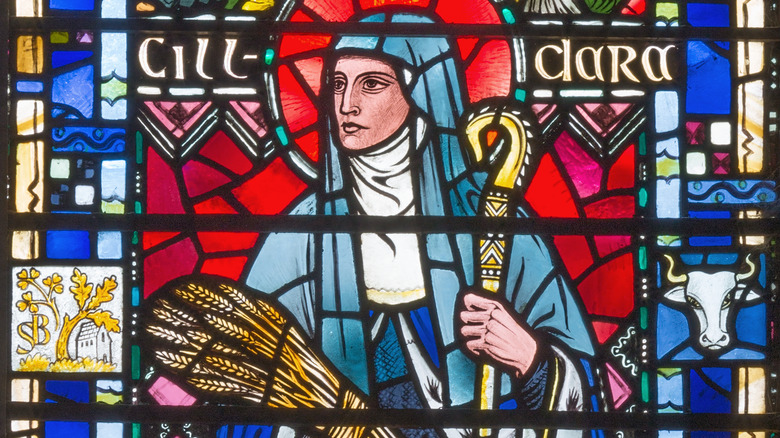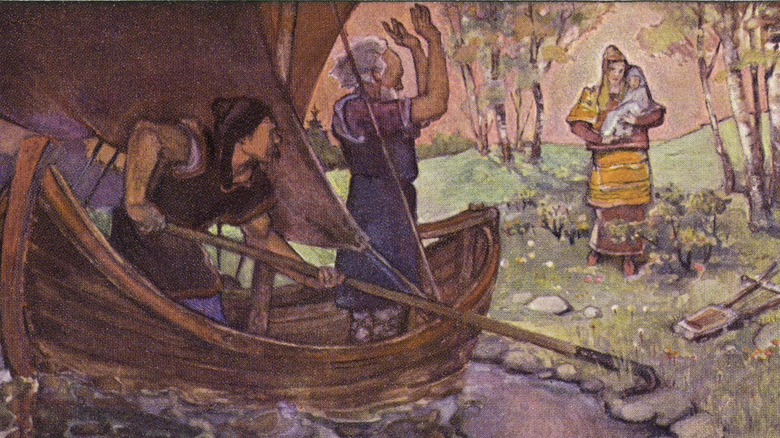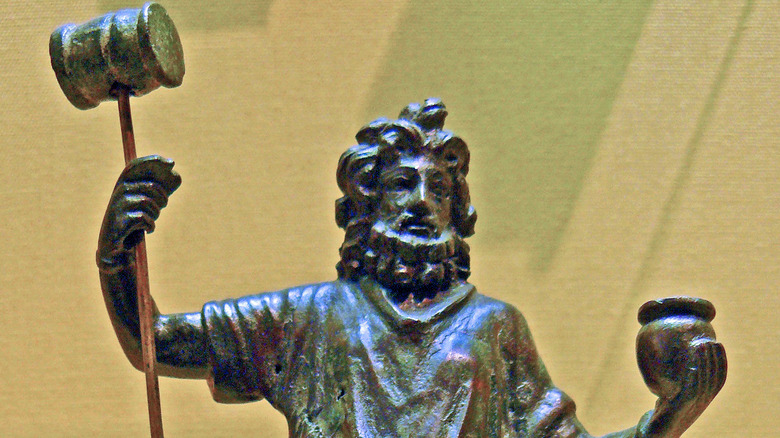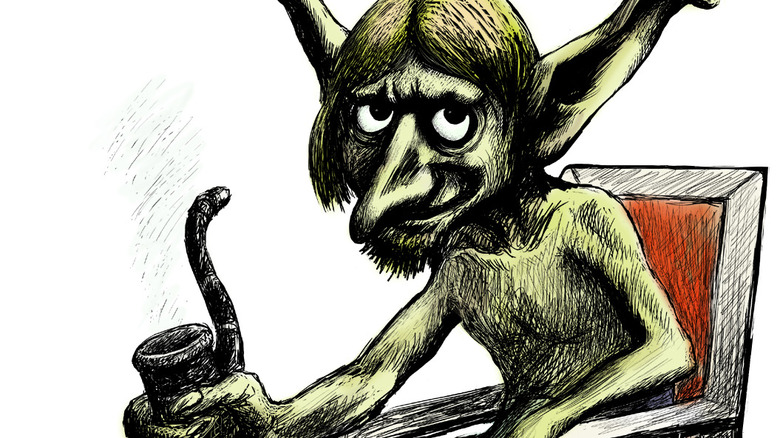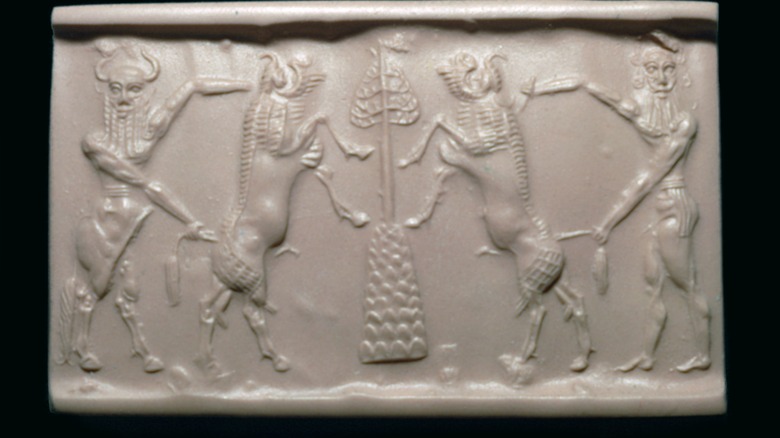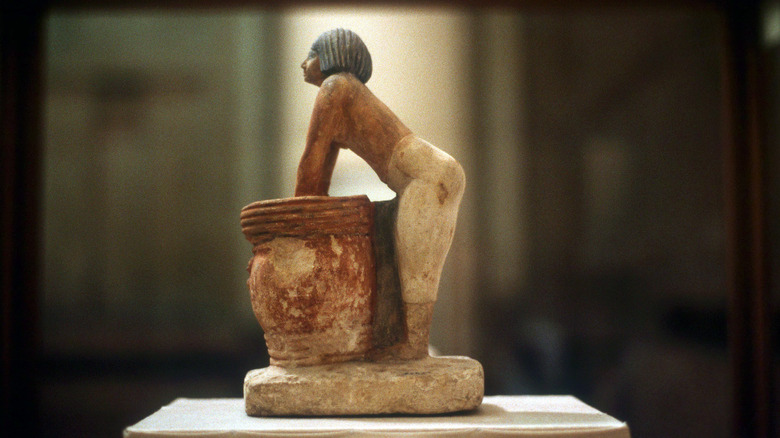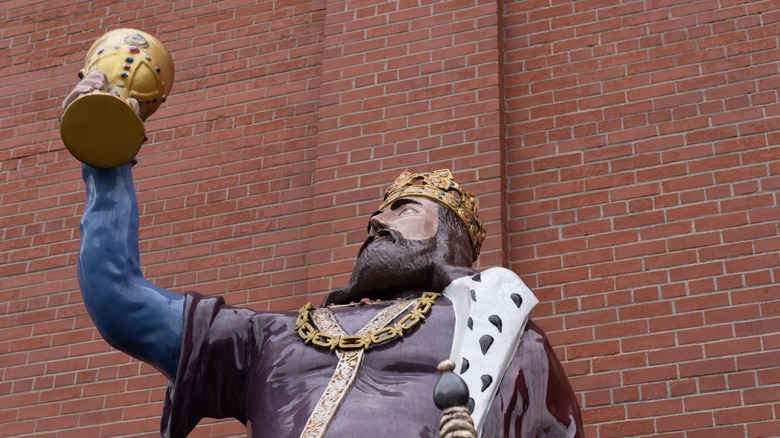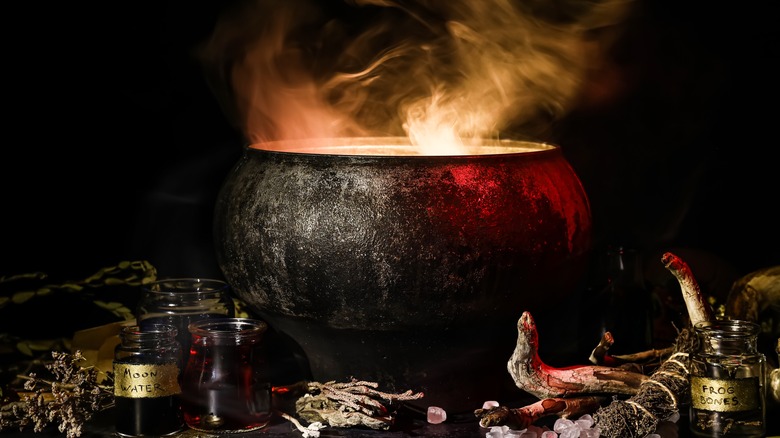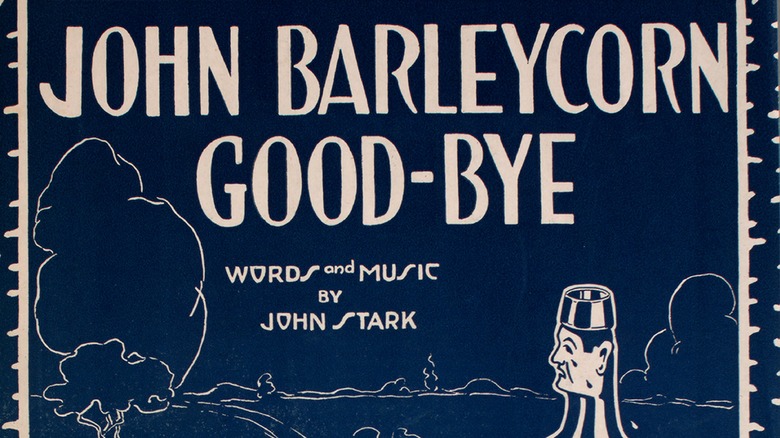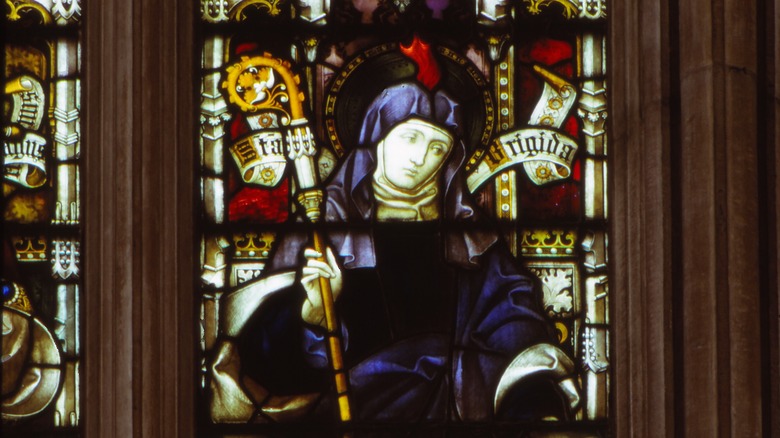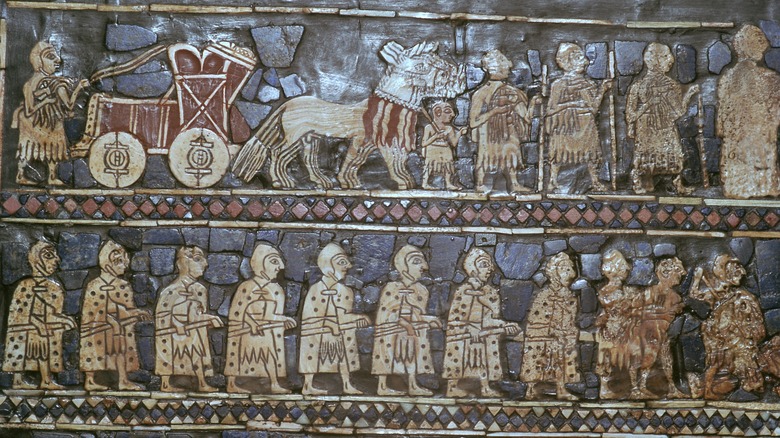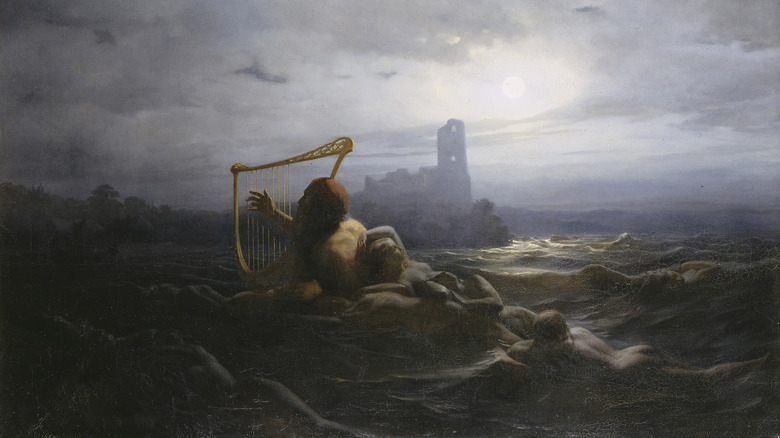11 Mythological Figures Associated With Beer
Beer is one of the world's oldest drinks, a delicious byproduct of the grains that built civilization itself. Brewers in ancient Mesopotamia are believed to have begun fermenting grains as early as 10,000 years ago; for that reason, beer is associated with many ancient myths, particularly stories that involve agricultural deities and gods of the harvest. Beer is frequently mentioned in the world's first ancient epic, the "Epic of Gilgamesh," and it has often been offered up by generous divine beings in national myths from across the world.
In Northern and Western Europe in particular, beer-drinking culture was once pervasive, playing a pleasurable part in the lives of ancient warriors, drunken monks, and ordinary peasants alike. Unsurprisingly many magical stories have been attached to the drink's potent effects, and beer appears as a sort of divine potion in both Celtic and Norse mythology. Those who love beer know that it is a blessing — and this luscious liquid has often been associated with miracle workers, stories of great reward, and heroes of old.
Osmotar from the Kalevala
"The Kalevala" is Finland's national epic, a collection of historic legends masterfully compiled into one text by author Elias Lönrott in the 19th century. As a hallowed book in Finland, the story can tell us a lot about Finnish priorities, and it should come as no surprise that a large chunk of the story concerns the invention of beer. Along with iron, fire, and the world itself, beer is one of the essential parts of life honored with an epic origin story in the poem.
Canto 20 of the "Kalevala" — the beer brewing canto — concerns a wedding feast at which the hostess Louhi asks for the secrets of beer brewing to satisfy her guests. What follows is a story about the creation of beer, in which Osmotar, the beer brewer, sets on a magic quest to gather the ingredients — thanks to some bears, a bird, and a bee — to make the "sparkling liquor." Notable in the magical recipe are things like hops and barley, two of the most common and well-known ingredients in beer.
The Gaulish God Sucellus
Sucellus is one of many Gaulish deities who survived into the Roman Period. He was a god of the underworld and could usually be seen wearing a wolfskin and holding what looks like a hammer. According to Max Nelson's "The Barbarian's Beverage," he has also been identified as a god of beer.
Succellus can often be found carrying a drinking vessel called an olla, and barrels appear to have been part of his iconography. Scholars seem to agree on the fact that the Gauls invented barrels and pioneered the art of barrel making. And, according to "The History of Food," by beer was the reason for the invention. As a deity of Gaul's pantheon, it stands to reason Sucellus' barrels were of the beer variety.
To keep the dead satiated, beer was the drink of the underworld. But Sucellus didn't just serve the dead, he was also father of mankind — and his barrels of brew were also an elixir for the living, bringing about that high life, as it were. So it's no surprise Succellus' association with beer has continued into the present — today the North Sound Brewing company has produced its very own Sucellus beer in the god's honor; the label is replete with an image of the deity, carrying his signature keg.
[Featured image by Siren-Com via Wikimedia Comons|Cropped and scaled|CC BY 3.0|
Biersals, AKA German beer goblins
A biersal is a type of German Kobold, or house sprite, associated with beer and breweries. Today the well-known Kobold Brewing company in Germany is named after the creatures due to their beery association.
In Germanic folklore, it was once believed that people's homes could become infested with these goblin-like creatures, who like to sing songs to children but also frequently punish wrong-doers. There are many different traditions associated with Kobolds in Germany, and it is popularly believed that they can be crafty tricksters. For example, some Kolbolds are said to steal items from around the house, such as farming implements.
In general, however, they are typically seen as helpful beings, who aid humans in their daily chores. Biersals in particular are generally pretty benign and will even clean beer cellars or glasses on behalf of the humans in residence. To keep them good-humored, humans should feed them a glass or two of booze on a daily basis.
Siduri and Enkidu from the Epic of Gilgamesh
For the characters of the world's oldest epic poem, the "Epic of Gilgamesh," beer was both a soothing draught and a symbol of civilization itself. Written in ancient Sumer approximately 4,000 years ago, the story concerns the travails of the King of Uruk, Gilgamesh, and his wild-man companion Enkidu.
Civilization and the wild are key themes in the epic, and some of the story concerns Gilgamesh's quest to tame his friend, the hairy savage Enkidu, who is not initially fit to walk the streets of Uruk with early man's urbane agriculturists. Ultimately, Enkidu's spirit is calmed by the fairer sex (a priestess named Shamat), and by the two greatest fruits of early agricultural society: bread and beer. In tablet II of the "Epic of Gilgamesh," Enkidu is plied with seven jugs of beer in an effort to clean him up to look more human.
Beer is used as a motif for a second time in the story when Gilgamesh is lost in a philosophical quagmire at the edge of the world. While there, he meets the mysterious Siduri, a beer goddess who runs a tavern on the edge of the ocean. The wise beer-giving deity advises Gilgamesh to get back to enjoying his life (and presumably his beer), rather than chasing immortality on his fruitless quest.
Tenenet, Egyptian goddess of beer and babies
One of the more obscure gods from the extremely large Egyptian pantheon, Tenenet (sometimes Tenenit or Tjenenet) was the goddess of beer. Her name derives from the Egyptian word for beer, Tenemu, and she was known to protect brewers and ensure they produced high-quality concoctions.
Beer was particularly important to the ancient Egyptians as an easy-to-make by-product of the harvest. The drink doubled as a filling meal, and it became such an important daily essential, it was even used to pay workers building the pyramids on the Giza plateau. Getting the brewing process right was, therefore, very serious business and required divine assistance.
Little is known about Tenenet herself, but according to the "Routledge Dictionary of Gods, Goddesses, Devils, and Demons," she appears in the sacred text the Egyptian "Book of Dead," as well as in some later Ptolemaic texts. Coupling fermentation with gestation, in addition to presiding over the brewing process, Tenenet also protected women during childbirth.
Gambrinus the beer king
King Gambrinus is the legendary inventor of beer from Northern Europe whose image has been used to decorate breweries around the world. Beer Advocate magazine asserts that he may even be based on a real person — a 13th-century duke named Jan Primus, whose family controlled Brabant and Flanders in the Middle Ages. While the beer-guzzling duke obviously did not actually invent beer, he was heavily involved with the local brewer's gild and had a reputation for heavy drinking. Craft Beer & Brewing magazine on the other hand argues Gambrinus may also be based on Jean sans Peur, the man responsible for adding hops to beer. Meanwhile, the Germans have often claimed Gambrinus for themselves, asserting he was a member of the ancient German Gambrivnii tribe, or possibly one of 12 mythical kings from ancient Germany (via Restore the King).
Whoever he originally was, King Gambrinus became an entirely mythical figure associated with many silly beer legends. According to one story, Gambrinus learned to brew beer from the devil himself, while the Bavarian text, the "Annales Bajorum," claims Gambrinus was taught to make it by the Egyptian goddess Isis.
Those looking to celebrate the king of beer will find there are more than a few 19th-century songs and poems about him, including James Henry's "Beerdrinker's Song."
Goibniu and his magic beer cauldron
The Celtic deity Goibniu was the Irish equivalent of the god Hephaestus in the Greek pantheon, a master smith and builder of tools. Although he is often associated with combat, Goibniu had a dual nature and, in addition to making weapons of war, he was also a healer and god of hospitality.
One of the life-enhancing potions Goibniu created was a type of magical ale made to nourish the Celtic pantheon (via Oxford Reference). According to John T. Koch's "Celtic Culture," like many other mythological Celtic figures, Goibniu was in possession of a magic cauldron.
He used his great pot to brew up food and drink, and he was officially in charge of catering to the gods at the divine feast of Fled Goibnenn, a celebration that took place in the mysterious Celtic Otherworld. In his great cauldron, Goibiniu made food and ale to satisfy his divine brethren. Similar to ambrosia in Greek mythology, Goibiniu's beer didn't just get his guests drunk — it provided them with immortality and eternal youth.
John Barleycorn
John Barleycorn is a hero from British folklore who represents the living embodiment of the harvest and the beer and whiskey the harvest creates. He is the subject of many folk songs, from Elizabethan times up to the 19th century. It is thought that his origins may stretch back even further than this and that his story may have arisen from some sort of pre-Christian spirit or deity associated with agriculture.
According to legend, John Barleycorn is subject to the cycles of nature and is usually in some kind of danger and eventually dies. Humans are typically not kind to John Barleycorn, despite the gifts he bestows on them. In the classic text "The Arraigning and Indicting of Sir John Barleycorn," the author laments: "His name is Sir John Barleycorn/who makes both beer and bread/What would do all that now are born/if Barleycorn was dead?"
Despite his troubles, this anthropomorphic heap of barley is nonetheless capable of a kind of beery immortality. In the version of the song created by Robert Burns, the poet tells us of John Barleycorn's death at the hands of literal grim reapers — but he goes on to celebrate his glorious afterlife as some form of alcoholic drink: "They wasted o'er a scorching flame/the marrow of his bones/but a miller us'd him worst of all/for he crush'd him between two stones/And they hae taen his very hero blood/and drank it round and round/and still the more and more they drank/their joy did more abound" (via Learn Religions).
Saint Brigid of Kildare
The mysterious Irish Saint, St. Brigid, was an early medieval figure associated with a number of miracles and marvels. The hallowed lady has an interesting history, and she may possibly be a partially fictional Catholic invention, one that drew inspiration from the pagan goddess with the same name.
According to the official line, St. Brigid died sometime during the sixth century A.D. and was once the slave of a druid priest. Finding faith in Christ, she went on to become a nun, founded Ireland's first nunnery, and performed many miracles — including the turning of bathwater into beer. The legend goes that Brigid was working at a leper colony when the lepers (who were most likely badly in need of a drink) ran out of the precious liquid. Brigid took the water the patients used for bathing and turned it into a delicious beer that was celebrated far and wide. On another occasion she is said to have supplied 18 churches with beer from just one barrel, ensuring Ireland's clerics were suitably wobbly and well-nourished throughout Easter.
Today St. Brigid is not only a patron saint of Ireland, she is also the patron saint of beer. A Medieval poem written in her honor celebrates her activities and the act of pious drinking: "I'd sit with the men, the women and God/There by the lake of beer/ We'd be drinking good health forever/And every drop would be a prayer" (via The Irish Post).
Ninkasi, Sumerian goddess of beer
In ancient Sumer beer was so loved that the ancients included Ninkasi, the goddess of beer, in their pantheon of gods. Beer in general was a very important drink to the various cultures of ancient Mesopotamia, although the substance they drank wouldn't be recognized as beer today due to its lumpy consistency — the brew often had bread floating in the mix and had to be drunk with a straw.
Sumerian priestesses of Ninkasi doubled as brewers, and beer was closely associated with divinity, appearing in many early myths as a drink of the gods. We know a little bit about the goddess herself thanks to a hymn dedicated to her from around 1800 B.C.E. that celebrates her beery magic. It's not only a song of praise, but it also gives detailed brewing instructions, which have aided archaeologists wishing to discover the drinking habits of the ancients. The poem describes the mixing of bread (bappir) into the drink: "You are the one who handles the dough [and] with a big shovel/Mixing in a pit, the bappir with sweet aromatics ..." (via World History Encyclopedia). According to Beer Advocate magazine, using the poem as a guide, a brewer from the Anchor Brewing Company actually managed to recreate the beer with the help of university lecturer, Soloman Katz, in the 1990s.
The Norse giant Ægir
A recurring character from Norse myth, Ægir ruled over the seas with his sister-wife Ran and brewed beer for the gods in his great cauldron. Resembling a mashup of Neptune and the Celtic god Goibniu, Ægir was commonly depicted as an old man with long white hair who lived in a coral cave. According to legend, the gods Thor and Thyr supplied the sea deity with his special pot, so that he could provide them with large quantities of ale.
Ale along with mead and fruit wine was often drunk in excess in medieval Scandinavia, and it is mentioned frequently in the Norse epics. As in the Celtic world, beer was sometimes afforded a magical quality in Norse legends — "memory-beer" in the Poetic Edda, for example, is used to retain a large amount of information when a story is told.
Ægir's feasting hall, where the gods are sedated with beer, is depicted as a place of peace for the sometimes violent Norse deities: "Of old the gods made feast together/And drink they sought ere sated they were/... /Rich fare in Ægir's hall they found." Today, mortals can imbibe the sea god's brew themselves at the Ægir Brewery in Norway, a respectable creator of craft beer with a brewpub situated in a Viking-style longhouse.
